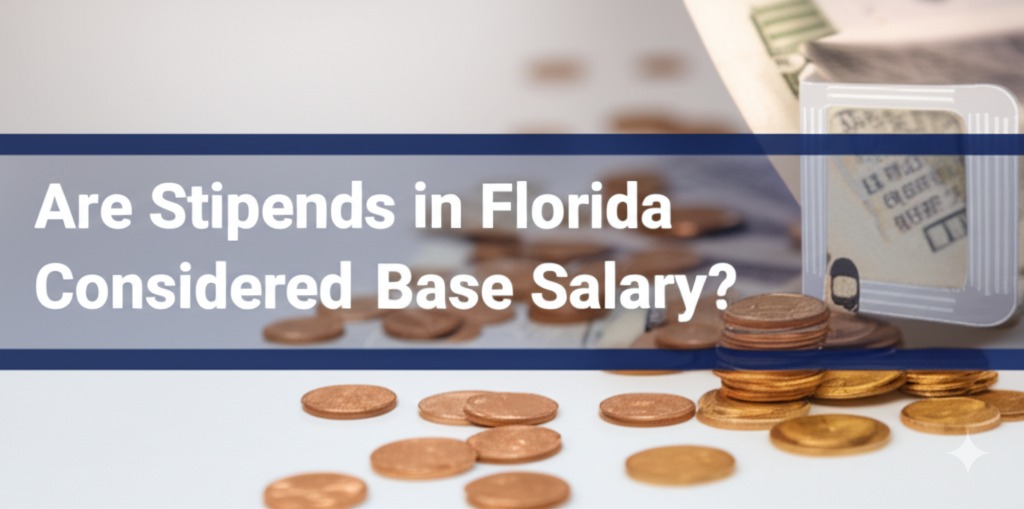
Introduction
When evaluating compensation packages, understanding the distinction between stipends and base salary is crucial, especially in states like Florida, where employment laws and compensation structures may vary. Many employees and employers alike wonder: Are stipends in Florida considered part of a base salary? The answer is essential for financial planning, tax obligations, and labor law compliance. This article explores the definition of stipends, their legal standing, and whether they contribute to a base salary in Florida.
What Is a Stipend?
A stipend is a fixed sum of money paid to individuals, often to cover expenses related to work, training, or education. Unlike regular wages, stipends are typically not directly tied to hours worked or specific job responsibilities.
Key Characteristics of Stipends:
- Fixed amount paid periodically (weekly, monthly, or annually)
- Not always taxable income depending on usage
- Often provided for internships, apprenticeships, or research positions
- Does not usually come with employee benefits like health insurance or retirement plans
What Is Base Salary?
A base salary is the fixed amount an employee earns before any bonuses, commissions, or stipends. It is the core compensation for an employee’s work and is subject to employment contracts, labor laws, and tax regulations.
Key Characteristics of Base Salary:
- Fixed annual or hourly compensation
- Subject to income tax and withholdings
- Used to calculate overtime pay (for non-exempt employees)
- Includes benefits such as health insurance, retirement contributions, and paid time off
Are Stipends Considered Base Salary in Florida?
Legal and Employment Perspective
In Florida, stipends are not considered base salary because they do not represent wages earned for services rendered in a standard employment arrangement. Instead, stipends are often classified as financial assistance rather than traditional compensation.
- Stipends do not count toward minimum wage calculations under Florida labor laws.
- Employers are not required to withhold taxes on stipends, though recipients may have tax obligations.
- Stipends are not factored into overtime pay calculations under the Fair Labor Standards Act (FLSA).
IRS and Tax Implications
From a tax perspective, stipends are not typically treated as wages but may still be taxable income. The IRS considers stipends to be a form of income, and recipients may need to report them on their tax returns.
Taxation factors include:
- If the stipend is used for qualifying expenses (such as education-related costs), it may be tax-exempt.
- If it is treated as a gift or reimbursement, taxation depends on the nature of the payment.
- If no taxes are withheld, recipients may need to pay self-employment taxes on stipends.
When Might a Stipend Be Considered Compensation?
Although stipends are generally not considered base salary, there are cases where they may be regarded as compensation under certain conditions:
- Graduate assistantships: Some universities in Florida pay graduate students a stipend that is considered taxable income but not a salary.
- Healthcare stipends: If an employer provides a health stipend in place of a traditional benefits package, it may be considered part of the overall compensation structure.
- Per diem payments: While not a salary, some stipends for travel or meal expenses may be structured similarly to wages.
Pros and Cons of Stipends vs. Base Salary
Pros of Stipends:
✅ Provides financial assistance for specific needs ✅ May be tax-free if used for qualified expenses ✅ Often allows for flexibility in use
Cons of Stipends:
❌ Not guaranteed or protected under wage laws ❌ No direct employment benefits (health insurance, retirement, etc.) ❌ May require tax reporting and self-employment taxes
Pros of Base Salary:
✅ Provides a stable and predictable income ✅ Comes with employer-sponsored benefits ✅ Used to calculate employment protections like overtime and unemployment benefits
Cons of Base Salary:
❌ Subject to income tax and withholdings ❌ Less flexibility compared to stipends
Conclusion
In Florida, stipends are generally not considered base salary because they do not meet the criteria of fixed wages tied to employment duties. However, they can still be an important part of an overall compensation package, depending on the industry and employment arrangement.
Key takeaways:
- Stipends provide financial support but do not count as traditional wages.
- They may be taxable or tax-exempt, depending on how they are used.
- Unlike base salary, stipends do not come with employment protections or benefits.
If you receive or offer stipends in Florida, it’s essential to consult with a tax professional or employment attorney to ensure compliance with federal and state regulations. Understanding these distinctions can help both employers and employees make informed financial decisions and avoid legal pitfalls.

Andre Cuevas provides career insights, job search strategies, and professional advice to help individuals navigate the job market and achieve their career goals.




